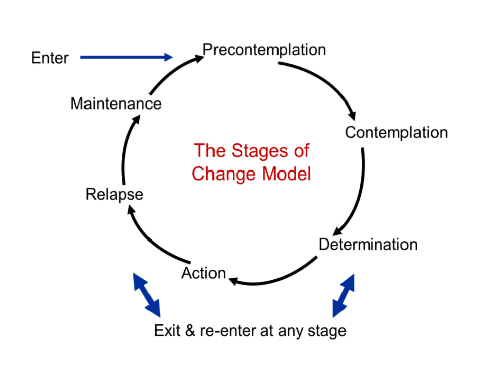Topic 4: Theoretical Frameworks And Models For Change – Essay From Experts NURSING ASSIGNMENTS SAMPLE Theoretical Frameworks and Models for Change
Transtheoretical Model of Behavior Change
The transtheoretical model of behavior change (TTM) is an integrative theory used for therapy to assess the readiness of an individual to respond to healthier environment. In addition, the transtheoretical model provides strategies and also processes of change that guide an individual. Therefore, individual’s readiness to change their behavior is determined through the framework provided by the transtheoretical theory (Miller & Connelly, 2020). Transtheoretical model of behavior change states that behavior change is a continuous progress involving change, precontemplation, contemplation, preparation, action, maintenance as well as termination.
We will write
a custom nursing essay or paper
specifically for you
Get your first paper with
15% OFF
Stages in the Transtheoretical Model of Behavior Change
The precotemplation stage in the transtheoretical theory is the stage where an individual is not intending to change their behavior in future. During the contemplation stage, individuals are aware of a problem existence and are trying to seriously formulate measures to overcome the problem but no action has been taken (Martinasek et al, 2021). The preparation stage on the other hand combines behavioral criteria and intention of individuals while the action stage is where individuals start to modify their environment, experiences and behavior towards overcoming their underlying problems. The maintenance stage of the transtheoretical theory involves people working to prevent relapse as well as consolidating the attained gains during the action stages. Lastly, individual sin the termination stage of the transtheoretical model have no desire to go back to their unhealthy lifestyle and behaviors. The termination stage gives an assurance of no relapse but inly few people make it this stage.
How to Apply Each Stage in the Transtheoretical Theory Model of Behavior Change
Precontemplation
During the precontemplation stage, the client is not interested in changing or might be unaware of the need to change (Dincelli, 2018). Therefore, the nurse should empathetically validate the clients’ lack of readiness to embrace change by reminding them that in control of when they want to change. However, the nurses should formulate tricks to calm the clients since most of them might become defensive at the precontemplation if they feel like they are being criticized or judged.
Contemplation
Clients in the contemplation stage of TTM are planning to start new behaviors in a span of six months. Despite having the knowledge that their behaviors have negative impacts on them, most of them become ambivalent to embrace change (Xiao, 2019). The nurse in this stage should therefore ask the clients open ended questions that will brainstorm their stepping up action thus connecting with the reason to change their values.
Preparation
In the preparation stage of TTM, most clients are ready to take action to behavior change for the next 30 days by taking noticeable steps like joining a gym (Xiao, 2019). Therefore, the nurse should verify if the clients have the right skills required for change.
Action
Clients in the action stage of TTM have already started implementing the stages and have been consistent for almost six months (Dincelli, 2018). During the action stage, the clients feel empowered and have adopted the new behavior and also learnt how to deal with lapses. The roe of the nurse is to reinforce the transition from external to internal rewards as well as avoiding burn out to the clients.
According to Dincelli (2018), when nurses apply the transtheoretical model properly, they establish rapport and trust with the clients. Ultimately, the nurse role in providing guidance creates a lasting change in the lives of the patients. Therefore, nurses should exercise effective application and professional application of the TTM by understanding all the stages. Clients tend to trust healthcare coaches since the experience they receive is authentic and non-judgmental.
Conceptual Model

References
Dincelli, E. (2018). Applying the Transtheoretical Model of Behavior Change to Online Self- Disclosure: Shifting from an Action Paradigm to a Stage Parad
Our Advantages
Quality Work
Unlimited Revisions
Affordable Pricing
24/7 Support
Fast Delivery